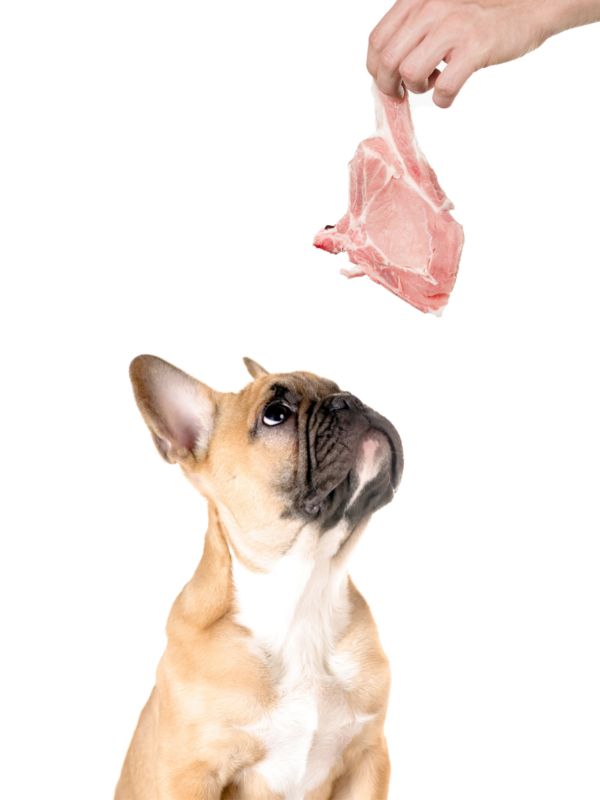No matter how old your pooch is, he needs to eat the perfect blend of nutrients daily so he has the energy to play with his toys, go out for walks, or get some sun (and enrichment!) from your backyard. Though many paw parents rely on purchasing commercially sold pet food to meet their dog’s nutritional needs, more people are starting to research which human foods dogs can eat and whip up homemade dog eats.
By reading this blog post, curious dog moms and dads will learn:
- The types of food dogs need in a day
- How meat plays an important role in their bodies
- Types of meat dogs can and cannot eat
- Additional reminders when it comes to feeding meat
The types of food dogs need in a day
Unlike cats that thrive on eating animal-derived protein to function at their best, dogs are omnivores that need to consume a combination of meat and plants. Since they are born with stronger teeth and bigger intestines, they have the capacity to chew and digest a wider variety of food types.
Your dog has to eat complete and balanced meals on a regular basis that are dependent on factors such as his age, his growth stage, his activities, and his medical or behavioural conditions. The scientifically formulated kibble or wet food should provide all the nutrients needed by your dog to prevent diseases. Protein, fat, carbohydrates, vitamins, minerals, and water should always be present.
How meat plays an important role in their bodies
A great source of protein, meat is defined as “animal flesh that is eaten as food.” Common sources of meat include calf, cattle, chicken, deer, duck, pig, sheep, and turkey.
Based on their genetic makeup, dogs need to consume high-quality meat sources that contain amino acids their bodies cannot create. These 10 essential amino acids are arginine, histidine, isoleucine, leucine, lysine, methionine, phenylalanine, threonine, tryptophan, and valine—all of which are vital for tissue growth and repair. These amino acids help with the formation and maintenance of your dog’s skin, fur, nails, blood, and joints.
Depending on your dog’s life stage, the minimum protein requirement ranges from eight to 18% of dry matter (DM). However, the Association of American Feed Control Officials recommends that dog food should have at least 18% for growth and 22% for maintenance. Anything over 30% of DM would most likely be excreted by your canine and could even be harmful in some cases.

Types of meat dogs can and cannot eat
When preparing meat for your dog, do not flavour it with unnecessary seasonings such as salt, garlic or onion (in fresh or powder form), and other potentially harmful herbs and spices. Similarly, preserved meat should not be given because of these ingredients.
Choose the lean parts of the meat, and remove the skin, fat, and bones before serving. Cooked bones may break into sharp shards that may tear at your dog’s mouth and throat, or create blockages in his airway and intestines. Depending on your vet’s recommendation, liver and other organs can be occassionally fed to your dog.
Additionally, make sure the meat is fully cooked before giving it to your pet. Undercooked or raw meat may contain harmful bacteria and parasites that can cause health complications. Avoid giving raw bacon, beef, chicken, and pork unless approved by your veterinarian.
Review the list below to find out which types of meat are safe and unsafe for dogs!
Meat safe for dogs:
Meat unsafe for dogs:
Additional reminders when it comes to feeding meat
Remember that every dog is different, so the homemade meal you prepare for one pet may not be suitable for another. In addition, the protein serving size and frequency should be based on your pooch’s age, size, weight, activity levels, and health conditions.
Before adding a new type of meat in your canine’s diet, remember to consult with your veterinarian as some dogs may be allergic or intolerant to certain proteins. VCA Animal Hospitals reports that dogs are commonly allergic to protein such as beef, chicken, and eggs. Food allergy symptoms include vomiting, diarrhea, and itchy paws, ears, or skin. Some dogs may also experience aggression, loss of energy or weight, and hyperactivity. Let him try a very small portion of the plainly cooked meat and observe him over the next 24 hours. If he doesn’t manifest any of the aforementioned symptoms, you can gradually increase the portions.
Now that you know which meats you can safely offer your dog, you should also find out which fruits and vegetables you can feed him. If you own a cat, you can discover which supermarket meats your feline friend can eat! Or check out our other food guides for puppies and seniors.
Leave a comment
Your email address will not be published. All fields are required.